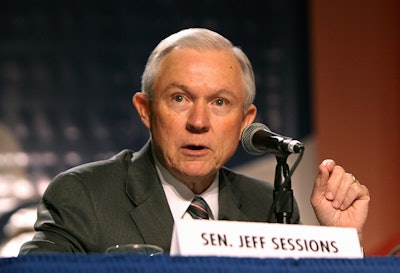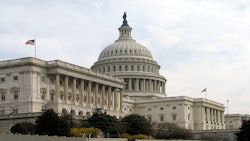
Last week, U.S. Attorney General Jeff Sessions reinvigorated the prosecutorial discretion of U.S. attorneys when, through a U.S. Department of Justice (DOJ) memo, he rescinded Obama-era federal policies that dictated how to enforce marijuana laws in states where the plant had been legalized. “In deciding which marijuana activities to prosecute under these laws with the [DOJ’s] finite resources, prosecutors should follow the well-established principles that govern all federal prosecutors,” he said.
The news raised significant questions about the future of state-legal cannabis businesses, which had formerly enjoyed some protections from federal prosecution through policies outlined in the Cole Memo (among those rescinded by the DOJ), written by former U.S. Deputy Attorney General James M. Cole in 2013. That memo directed U.S. attorneys to de-prioritize prosecution of state-legal cannabis businesses, unless they were in violation of any of eight guidelines (essentially violating both state and federal law).
In most cases, those attorneys have publicly sided with current state law in their respective jurisdictions, not considering state-legal cannabis businesses a priority for law enforcement. U.S. Attorney Bob Troyer, of the District of Colorado, said that his office has “already been guided by these principles in marijuana prosecutions—focusing in particular on identifying and prosecuting those who create the greatest safety threats to our communities around the state.”
Throughout the U.S., the range of regulatory frameworks and the open-ended nature of Sessions’ announcement, however, are producing some sense of uncertainty.
In some states, prosecution may once again lean heavily on federal interpretations of the law. In Massachusetts, for instance, U.S. attorney Andrew Lelling said that the enforcement issue remains “straightforward,” pointing out that groups in his state have been asking for clarification since Sessions’ Jan. 4 announcement.
“I cannot, however, provide assurances that certain categories of participants in the state-level marijuana trade will be immune from federal prosecution,” he said in a public statement. Massachusetts’ retail market is slated to roll out in July.
What may be most telling is the crop of new U.S. attorneys in California, each serving as either an appointee of Sessions or a nominee of President Donald Trump or, in one case, as an acting U.S. attorney. Not one of those four attorneys has offered a public statement on the prosecution of marijuana-related offenses. In California, adult-use marijuana sales became legal on Jan. 1.
For states with legal medical marijuana programs, the situation is similarly unclear. While the Cole Memo offered protection for state-legal marijuana programs, it was also complemented by the Rohrabacher-Blumenauer amendment, which functions as an appropriations clause that prohibits the U.S. DOJ from funding prosecution involving medical marijuana. The amendment has been extended, for now, though Jan. 19, when federal lawmakers must approve a new spending bill.
While that amendment remains on the books, it would be violation of federal law to prosecute an operator, for instance, of a medical marijuana dispensary. On top of the Sessions uncertainty, though, cannabis-business operators will surely be watching Congress closely on Jan. 19.
Many of these medical programs are in fledgling stages—and patients, like prospective growers and dispensary owners, are sure to have even more questions about the laws surrounding marijuana sales and use.
And on top of those 29 medical states, there are 16 states that allow CBD-only medications to be sold and used. In Kentucky, for instance, which has a CBD-only program, Sen. Rand Paul responded to the Cole Memo news: “I continue to believe that this is a states’ rights issue, and the federal government has better things to focus on.” Much like the medical marijuana states (which allow products that include THC), officials in those CBD-only states will be watching the Jan. 19 the Rohrabacher-Blumenauer amendment news very closely.
Below, we've gathered the public stances of U.S. attorneys in the eight states where adult-use marijuana is fully legal. Their stances paint a shifting portrait of marijuana enforcement policy in this country, where public safety is being encouraged above any talk of a judicial crackdown. Further down the list, we’ve gathered some perspectives from U.S. attorneys in the 29 states with medical marijuana programs.
DOJ Memorandum on Marijuana Prosecution by sandydocs on Scribd
ALASKA
Bryan Schroder, U.S. Attorney for the District of Alaska
Nominated by President Donald Trump
"One of the key [principles] is to follow federal law enforcement priorities, both at the national and local levels," Schroder said. "The highest priorities of the U.S. Attorney's Office in Alaska are consistent with those of the Justice Department nationally: combating violent crime, including as it stems from the scourge of drug trafficking. Consistent with those priorities, the U.S. Attorney's Office released an Anti-Violent Crime Strategy in October of the past year. We will continue to focus on cases that meet those priorities."
CALIFORNIA
Nicola Hanna, U.S. Attorney for the Central District of California
Appointed by U.S. Attorney General Jeff Sessions
Hanna has not offered a public statement on how his office will address the Cole Memo repeal. He worked as a federal prosecutor in central and southern California in the 1990s, overseeing an era of robust marijuana prosecution.
McGregor Scott, U.S. Attorney for the Eastern District of California
Nominated by President Donald Trump
A spokesperson from Scott’s office said that marijuana violations in the Eastern District will be evaluated “in accordance with our district’s federal law enforcement priorities and resources.”
Alex Tse, U.S. Attorney for the Northern District of California
Serving as acting U.S. attorney, after previous U.S. attorney Brian Stretch abruptly resigned on the same day as Sessions’ announcement
Tse was appointed quickly last week and has not yet offered a public stance on the marijuana policy shift. He worked under former U.S. attorney Brian Stretch, who had attempted unsuccessfully to prosecute a medical marijuana operation in California.
Adam Braverman, U.S. Attorney for the Southern District of California
Appointed by U.S. Attorney General Jeff Sessions
“The Department of Justice is committed to reducing violent crime and enforcing the laws as enacted by Congress. The cultivation, distribution, and possession of marijuana has long been and remains a violation of federal law. We will continue to utilize long-established prosecutorial priorities to carry out our mission to combat violent crime, disrupt and dismantle transnational criminal organizations, and stem the rising tide of the drug crisis.”
COLORADO
Bob Troyer, U.S. Attorney for the District of Colorado
Appointed by U.S. Attorney General Jeff Sessions
“Today the Attorney General rescinded the Cole Memo on marijuana prosecutions, and directed that federal marijuana prosecution decisions be governed by the same principles that have long governed all of our prosecution decisions. The United States Attorney’s Office in Colorado has already been guided by these principles in marijuana prosecutions—focusing in particular on identifying and prosecuting those who create the greatest safety threats to our communities around the state. We will, consistent with the Attorney General’s latest guidance, continue to take this approach in all of our work with our law enforcement partners throughout Colorado.”
MAINE
Halsey B. Frank, U.S. Attorney for the District of Maine
Nominated by President Donald Trump
“I have received numerous inquiries from members of the media, government officials, and others seeking guidance from this office about its approach to enforcing the federal marijuana laws. Those laws make the production, distribution and possession of marijuana illegal based on its classification by Congress as a Schedule I Controlled Substance because Congress determined that it has a high potential for abuse and dependence and has no acceptable medical use.
“As the chief federal law enforcement officer in this district, my job is to enforce federal law, not countermand it. While I have some discretion in how my office does so in any particular case, that discretion is guided by the Principles of Federal Prosecution of the Department of Justice (DOJ). Those principles include the interests of society, the public’s confidence in the criminal justice system, federal law enforcement priorities, the nature and seriousness of the offense, the deterrent effect of prosecution, the person's culpability in connection with the offense, their criminal history and willingness to cooperate in the investigation or prosecution of others, the interests of any victims, and the probable sentence or other consequences if the person is convicted, all in light of the DOJ’s and my office’s limited resources. I do not have the authority to categorically declare that my office will not prosecute a class of crime or persons.
“Rather, we must proceed on a case-by-case basis, individually assessing each matter according to DOJ’s Principles and deciding whether to use our resources to pursue it. DOJ’s national priorities include the rule of law, national security and terrorism, immigration, violent crime and international gangs such as MS-13, the opiate crisis, supporting law enforcement, and promoting public confidence. In addition, our local priorities include domestic violence and guns, human trafficking, and elder fraud. We will work with our federal, state, local and tribal partners to focus on those who pose the greatest threat to the people and communities that we serve.
“With respect to the prosecution of drug offenses, this office has prioritized the prosecution of cases involving the trafficking of opiates, cocaine, crack and similar hard drugs. We have also prosecuted large-scale marijuana distribution organizations and did so even while operating under the recently rescinded DOJ guidance. Prosecution of drug possession cases has not been a priority.”
MASSACHUSETTS
Andrew Lelling, U.S. Attorney for the District of Massachusetts
Nominated by President Donald Trump
“I understand that there are people and groups looking for additional guidance from this office about its approach to enforcing federal laws criminalizing marijuana cultivation and trafficking. I cannot, however, provide assurances that certain categories of participants in the state-level marijuana trade will be immune from federal prosecution.
“This is a straightforward rule of law issue. Congress has unambiguously made it a federal crime to cultivate, distribute and/or possess marijuana. As a law enforcement officer in the Executive Branch, it is my sworn responsibility to enforce that law, guided by the Principles of Federal Prosecution. To do that, however, I must proceed on a case-by-case basis, assessing each matter according to those principles and deciding whether to use limited federal resources to pursue it.
“Deciding, in advance, to immunize a certain category of actors from federal prosecution would be to effectively amend the laws Congress has already passed, and that I will not do. The kind of categorical relief sought by those engaged in state-level marijuana legalization efforts can only come from the legislative process.”
Lelling’s comments have prompted the most concern this week. That state’s retail market won’t be live until this summer, and his preemptive interpretation of Sessions’ announcement has some dispensary owners worried. Derek Stewart, the dispensary supervisor at Healthy Pharms in Georgetown, Mass., tells the Newbury Port News, "Right now, I don't think medical cannabis businesses are under the gun right this second," Stewart said. "There's still a protection in place for us right now on the federal side of things, but we don't know what the future holds for us."
Massachusetts Gov. Charlie Baker also responded to Lelling’s comments, saying: “What I would stress to him is the big public health crisis we’re dealing with in the Commonwealth these days is opioid addiction and street drugs like fentanyl. … A big message to the [U.S. Attorney’s] office should be, if you have limited resources, let’s focus on the thing that is killing people every day here in the Commonwealth.”
NEVADA
Dayle Elieson, U.S. Attorney for the District of Nevada
Appointed by U.S. Attorney General Jeff Sessions
Elieson has been quiet on the Jeff Sessions subject, but The Las Vegas Journal-Review reported this week that Gov. Brian Sandoval would like the U.S. Attorney’s office to match Colorado’s example. “I know that the U.S. attorney in Colorado has already said that he is not going to enforce federal laws against the legalized marijuana industry in that state,” Sandoval told the paper. “I would like to see something similar here in Nevada, but that’s a discussion that needs to be had.”
OREGON
Billy Williams, U.S. Attorney for the District of Oregon
Nominated by President Donald Trump after having held the post since 2015
"As noted by Attorney General Sessions, today’s memo on marijuana enforcement directs all U.S. Attorneys to use the reasoned exercise of discretion when pursuing prosecutions related to marijuana crimes. We will continue working with our federal, state, local and tribal law enforcement partners to pursue shared public safety objectives, with an emphasis on stemming the overproduction of marijuana and the diversion of marijuana out of state, dismantling criminal organizations and thwarting violent crime in our communities.”
On Jan. 12, Williams published an op-ed in the Oregonian, in which he criticized Oregon's "overproduction problem" and asked for more transparency from the state.
"Rural communities simply do not have the resources to fund the additional police and sheriff deputies needed to address these issues," he wrote. "While state officials have allocated a portion of marijuana tax revenues to public safety organizations including the Oregon State Police, the net effect on enforcement remains an open question. Moreover, can 20 Oregon Liquor Control Commission marijuana enforcement specialists adequately police thousands of recreational licensees?
"We don't know the answer to these questions, in part, because the state has yet to release a final version of its report evaluating out-of-state diversion, distribution to minors, cultivation on public land and violent crime associated with marijuana in Oregon. We need this information to move forward smartly, effectively, and transparently.
"In sum, I have significant concerns about the state's current regulatory framework and the resources allocated to policing marijuana in Oregon."
WASHINGTON
Annette L. Hayes, U.S. Attorney for the Western District of Washington
In office since 2014, when previous attorney resigned
“Today the Attorney General reiterated his confidence in the basic principles that guide the discretion of all U.S. Attorneys around the country, and directed that those principles shepherd enforcement of federal law regarding marijuana. He also emphasized his belief that U.S. Attorneys are in the best position to address public safety in their districts, and address the crime control problems that are pressing in their communities. Those principles have always been at the core of what the United States Attorney’s Office for Western Washington has done—across all threats to public safety, including those relating to marijuana. As a result, we have investigated and prosecuted over many years cases involving organized crime, violent and gun threats, and financial crimes related to marijuana. We will continue to do so to ensure—consistent with the most recent guidance from the Department—that our enforcement efforts with our federal, state, local and tribal partners focus on those who pose the greatest safety risk to the people and communities we serve.”
Joseph H. Harrington, U.S. Attorney for the Eastern District of Washington
Appointed by U.S. Attorney General Jeff Sessions
“The Attorney General reiterated his confidence in the long-established principles of federal prosecution that guide the discretion of each United States Attorney around the country (U.S. Attorney’s Manual, chapter 9-27.000), and directed that those principles shepherd enforcement of federal law regarding marijuana. With those principles in mind, the Attorney General emphasized his belief that United States Attorneys are in the best position to weigh all relevant considerations—to include the nature and seriousness of an offense, the potential deterrence effect of prosecution, a putative defendant’s culpability in connection with an offense, a putative defendant’s criminal history and other circumstances, and the limited federal resources—when deciding which cases to prosecute in their respective communities. When weighing those considerations public safety is always at the fore.
“Those principles have always been at the core of what the United States Attorney’s Office for the Eastern District of Washington does—across all threats to public safety, including those that may relate to marijuana. This United States Attorney’s Office will continue to ensure, consistent with the most recent guidance from the Department of Justice, that its enforcement efforts with our federal, state, local, and tribal law enforcement partners focus on those who pose the greatest safety risk to the communities in Eastern Washington, by disrupting criminal organizations, tackling the growing drug crisis, thwarting violent crime, and corralling white-collar fraudsters in this District.”
***
Medical States
Here is a quick look at some of the U.S. attorneys overseeing state districts with active medical marijuana programs.
ARKANSAS
Cody Hiland, U.S. Attorney for the Eastern District of Arkansas
"I took an oath to uphold the Constitution and the laws of the United States, and that is what this office has done and will continue to do throughout my term as U.S. Attorney. To that end, we will continue to exercise our prosecutorial discretion and evaluate criminal cases on an individual basis as it relates to the law and the facts as presented."
Duane Kees, U.S. Attorney for the Western District of Arkansas
Nominated by President Donald Trump
No public comment.
ARIZONA
Elizabeth Strange, First Assistant U.S. Attorney for the District of Arizona
No public comment. The U.S. Attorney for the District of Arizona has a long-running policy of only prosecuting cannabis cases that involve border-crossing trafficking or at least 500 pounds of cannabis, according to Phoenix New Times.
CONNECTICUT
John Durham, U.S. Attorney for the District of Connecticut
Appointed by U.S. Attorney General Jeff Sessions
"Federal laws are properly enacted, modified and repealed by Congress, not the Department of Justice. The U.S. Attorney's Office in Connecticut will continue to prosecute violations of federal law consistent with priorities established by the Justice Department and our Office."
DELAWARE
David Weiss, U.S. Attorney for the District of Delaware
“The U.S. Attorney’s Office for the District of Delaware will utilize the long-established prosecutorial principles to carry out the shared commitment with the Justice Department to combat violent crime and the scourge of drug offenses plaguing our community.”
FLORIDA
Christopher Canova, U.S. Attorney for the Northern District of Florida
No public comment.
Benjamin Greenberg, U.S. Attorney for the Southern District of Florida
No public comment.
Chapa Lopez, U.S. Attorney for the Middle District of Florida
No public comment.
HAWAII
Kenji Price, Interim U.S. Attorney for the District of Hawaii
No public comment.
ILLINOIS
John Lausch Jr., U.S. Attorney for the Northern District of Illinois
Nominated by President Donald Trump
No public comment.
John Childress, U.S. Attorney for the Central District of Illinois
Appointed by U.S. Attorney General Jeff Sessions
“For citizens of central Illinois, the Justice Department memo issued today on marijuana enforcement does not change long-established prosecutorial principles to enforce federal law. The U.S. Attorney’s Office will continue to work together with our law enforcement partners, to promote the safety and interests of our local communities.”
Donald Boyce, U.S. Attorney for the Southern District of Illinois
No public comment.
LOUISIANA
Duane Evans, Interim U.S. Attorney for the Eastern District of Louisiana
No public comment.
Alexander Van Hook, Acting U.S. Attorney for the Western District of Louisiana
No public comment.
Corey Amundson, U.S. Attorney for the Middle District of Louisiana
"Since our approach is consistent with the Attorney General's announcement, we do not anticipate a significant change in the federal enforcement of marijuana activities in this district.”
MARYLAND
Stephen Schenning, U.S. Attorney for the District of Maryland
No public comment.
MICHIGAN
Matthew Schneider, U.S. Attorney for the Eastern District of Michigan
According to the Detroit News, Schneider said: “This office will review marijuana cases in terms of where those cases fit within our priorities and our limited federal resources, In every criminal case, we will rely upon the Justice Department's long-established principles of federal prosecution as all U.S. Attorneys have done since 1980.”
Andrew Birge, Acting U.S. Attorney for the Western District of Michigan
No public comment.
MINNESOTA
Gregory Brooker, U.S. Attorney for the District of Minnesota
Appointed by U.S. Attorney General Jeff Sessions
No public comment.
MONTANA
Kurt Alme, U.S. Attorney for the District of Montana
Nominated by President Donald Trump
“Yesterday, the Attorney General rescinded the Cole Memo on marijuana prosecutions and directed that federal marijuana prosecution decisions be governed by the same principles that govern all federal prosecution decisions. The United States Attorney’s Office in Montana is guided by these principles in marijuana prosecutions—focusing in particular on identifying and prosecuting those who create the greatest safety threats to our citizens and communities. Consistent with the Attorney General’s latest guidance, we will continue to take this approach in all of our work with our law enforcement partners throughout Montana.”
NEW HAMPSHIRE
John Farley, Acting U.S. Attorney for the District of New Hampshire
According to the New Hampshire Union Leader, Farley’s office “will rely on the long-established prosecutorial principles of the Justice Department to determine when it is appropriate to prosecute cases involving marijuana.
“In making prosecution decisions, we will consider all applicable federal laws and will evaluate all relevant considerations, including the department’s law enforcement priorities, the seriousness of the crime, the deterrent effect of the prosecution, and the impact of the particular crime on the community.”
NEW JERSEY
Craig Carpenito, U.S. Attorney for the District of New Jersey
Appointed by U.S. Attorney General Jeff Sessions
No public comment.
NEW MEXICO
James Tierney, Acting U.S. Attorney for the District of New Mexico
No public comment.
NEW YORK
Geoffrey Berman, U.S. Attorney for the Southern District of New York
No public comment.
Grant Jaquith, U.S. Attorney for the Northern District of New York
No public comment.
Richard Donoghue, U.S. Attorney for the Eastern District of New York
No public comment.
James Kennedy Jr., U.S. Attorney for the Western District of New York
No public comment.
NORTH DAKOTA
Christopher Myers, U.S. Attorney for the District of North Dakota
According to the West Fargo Pioneer, Myers said: “I can't speculate on what might happen down the road because we don't have any certainty as to how the state is going to set up and implement that [medical] program.”
OHIO
Justin Herdman, U.S. Attorney for the Northern District of Ohio
Nominated by President Donald Trump
In an interview with Cleveland.com, Herdman said: “We're going to still continue to be in a position to prosecute those cases, and marijuana's still illegal under federal law just like it was last week, so that doesn't change.”
Benjamin Glassman, U.S. Attorney for the Southern District of Ohio
"Congress made marijuana illegal under the Controlled Substances Act. That was true under Deputy Attorney General Cole's 2013 memorandum on marijuana enforcement, and it's just as true under the attorney general's memorandum today.”
PENNSYLVANIA
Louis Lappen, U.S. Attorney for the Eastern District of Pennsylvania
No public comment.
Scott Brady, U.S. Attorney for the Western District of Pennsylvania
“This office will continue to deploy all prosecutorial tools at our disposal to protect the citizens of western Pennsylvania from those individuals and criminal organizations which traffic in all illegal controlled substances, including marijuana.”
Pennsylvania Gov. Tom Wolf, however, quickly released a statement in response to the DOJ memo vowing to protect medical marijuana patients:
“Despite backwards moves by the Trump administration, I will continue to protect cancer patients, kids with epilepsy, veterans with PTSD and all Pennsylvanians seeking relief from legal medical marijuana. In Pennsylvania, we legalized medical marijuana in an overwhelming and bipartisan fashion, and we are months away from getting this medicine to patients that need it.
“The Trump Administration must put patients’ rights first, and I will not stand for backwards attacks on the progress made in Pennsylvania to provide medicine to those in need. We are evaluating the exact impact rescinding the directive could have on Pennsylvania’s medical marijuana program, but I will continue to do everything in my power to protect Pennsylvania patients.”
RHODE ISLAND
Stephen Dambruch, U.S. Attorney for the District of Rhode Island
Appointed by U.S. Attorney General Jeff Sessions
No public comment.
VERMONT
Christina Nolan, U.S. Attorney for the District of Vermont
Nominated by President Donald Trump
According to WCAX, Nolan said, “[A] top priority of mine and across the country is to reduce drug-related violence ... and so a marijuana case, heroin case, and a case that commits violence and guns will be a consideration we use to bring prosecution.”
Once Gov. Phil Scott signs a bill approved by the Vermont General Assembly, the state will allow adult-use marijuana in July. The law will permit up possession of up to one ounce and home-grow operations of two mature plants (or four immature plants) at any given time.
WEST VIRGINIA
William Powell, U.S. Attorney for the Northern District of West Virginia
Nominated by President Donald Trump
Powell’s office will “continue its shared commitment with the Justice Department to combat violent crime and the scourge of drug offenses plaguing our community.
“West Virginia remains first in the nation in overdose deaths per capita. We are working hand in hand with our task forces, other law enforcement agencies and county prosecutor partners to prosecute those who are delivering poison to our communities and committing violent crimes.
“The Attorney General has entrusted me to deploy our resources and prioritize our work in a manner to best accomplish these goals. I will honor that trust by always doing what is best for this district.”
Michael Stuart, U.S. Attorney for the Southern District of West Virginia
Nominated by President Donald Trump
According to MetroNews “Talkline,” Stuart said, “I think [marijuana is] a little dubious for medical use, however, the Rohrabacher amendment and Congressional mandate has made very clear, including here in West Virginia, that we’re going to leave the states the use for medical purposes of medical marijuana.”
Top photo by Gage Skidmore/Wikimedia


























